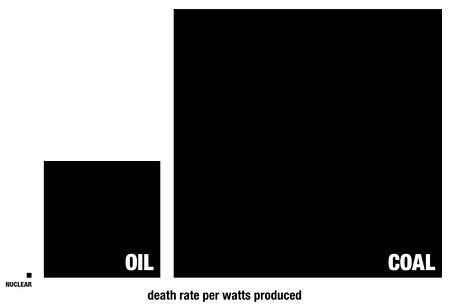Posts Tagged ‘wind power’
Causa Mortis…
It’s no wonder, what with Fukushima and all, that there’s renewed worry about the safety of nuclear power. As that tragic episode demonstrates, it’s an altogether justified concern. But what of the alternatives?
The Lifeboat Foundation‘s Next Big Future did the homework, quantifying the inclusive mortality rates from the use of coal, oil, natural gas, biomass/biofuel, peat, solar, wind, hydro, and nuclear to generate electricity. The detailed results, with supporting research, are here; that detail is graphically portrayed here…
By way of putting nuclear into context, Seth Godin summarizes the comparison:

There are objections one might raise to the research used (it doesn’t, for instance, take into account the implications of the long half-lives of radioactive contaminants, nor less-than- or indirectly-fatal effects like impact on the endocrine system). But in any case, the point is not, of course, that one shouldn’t be concerned with nuclear safety; the events of the last couple of weeks are ample evidence that it’s critical.
Rather (and graphically obviously) the point is that one should be even more concerned about– and active in addressing– the risks of fossil fuel generation.
The title of Seth’s post: “The triumph of coal marketing.” Indeed.
As we hustle to harness the wind, we might might recall that it was on this date in 1855 that Canadian physician, geologist, and inventor Abraham Gesner received the first U.S. patent for a process to obtain oil from bituminous shale and cannel coal for the purpose of illumination (No. 12,612); he called the product “kerosene.”
When the facts are just too confusing…
Fake Science to the rescue, with entries both informative…

and useful…

More, at Fake Science.
As we try to remember how to spell “paramecium,” we might recall that this is the birthday of the first woman in the Western world considered to be a mathematician: Maria Gaetana Agnesi, born this date in 1718. While she thought and wrote broadly about natural science and philosophy, she is best remembered for her work in differential calculus– perhaps most particularly for her work on the cubic curve now know as the “witch of Agnesi.”


You must be logged in to post a comment.